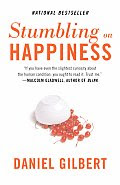
By Daniel Gilbert
The self-help book industry is huge, giving the public much advice on how to be thin, be sucessful and ultimately how to be happy. This book does not tell you how to be happy. What it does tell you is how the human brain functions in the pursuit of happiness. It gives us suggestions on how to utilize this information, but it does not tell you how to be happy.
What we learn is we cannot ever reasonably predict our future feelings due to our imagination. We are the only creatures on this planet who not only think about, but imagine the future. But current and past influences skew our imaginations into a warped version of what our future may bring. We think this imagining is the way things absolutely will be and then are constantly disappointed in outcomes that are diferent.
Society is also a factor. We are told make more, spend more, breed more, ultimately to keep society functioning for the greater good, not for our individual happiness. Case in point, I do not want to have children. I don't like 'em, I don't know what to do with them. I can reasonably predict I would feel resentful towards them. I feel resentment towards my neighbor when his screaming wakes me up at 7:30 am, why wouldn't I feel resentful towards a screaming baby at that hour? Even if it's the blood of my loins and all. So I choose to not have children so I do not make some poor child unhappy with my terrible parenting, and I'm making myself happy by not feeling resentful and bitter for 18 years. But society would have me have children, so there are more people to fuel the economy. "Life, Liberty, and the Pursuit of Happiness." be damned, you
need to have children and while your at it you
need to buy a
$900 stroller.
So what can we do to be happy? As I said there is no instruction list in this book. What I took away from it is I need to make predictions based of what I know, not what I imagine. For example, I have Crohn's Disease. Popcorn makes it act up. Popcorn smells really good. When someone makes popcorn and it smells so good, it is tempting to eat some. Now I could eat the popcorn, I could savor that puffy, salty, buttery goodness and be really happy about it for about 5 minutes. But what I know is about 24 hours later, I will be curled up on my bathroom floor for about 5 hours praying for death. According to Mr. Gilbert the way the brain works, it would actually have me keep eating the popcorn, resulting in 5 hours of pain for the 5 minutes of pleasure. This is true as it took me several years to figure out the same action would keep producing the same result. Fortunately, I'm already on the road to happiness as I have retrained myself over the years not to eat things that cause Crohn's flare ups, no matter how good that food may taste.
So for an experiment I'm going to try a new way of thinking about loosing weight. I've always gone into the weight loss thing with the idea that if I lose weight things will be so much better! Clothes will fit! Boys will like me! I will be able to manage my finances! OK, maybe not the latter but you get the point. What I know is if I loose weight I will physically feel better. When I was 20lbs lighter I could move faster, lift more, and wasn't so wiped out all the time. I shouldn't imagine what it will be like because I can't know what the outcome will be. So my goal is to loose weight to gain physical health. To be able to do run for an emergency at work and not feel like I'm having a minor heart attack. Anything else is just icing on the cake.


 By Daniel Gilbert
By Daniel Gilbert By Alice Sebold
By Alice Sebold By Ian McEwan
By Ian McEwan By John Irving
By John Irving By Stephen King
By Stephen King